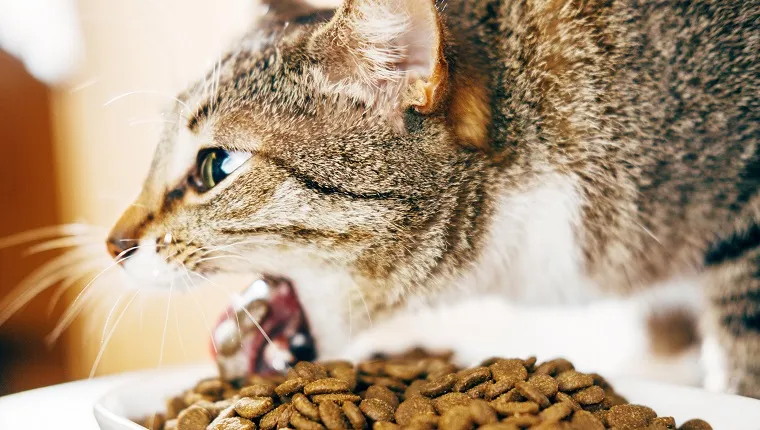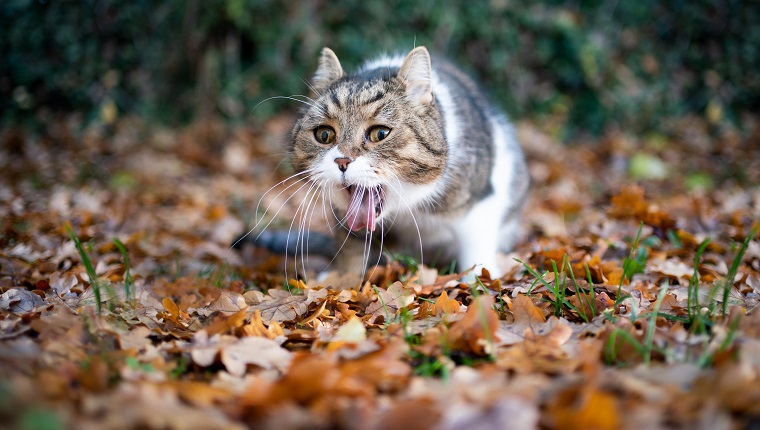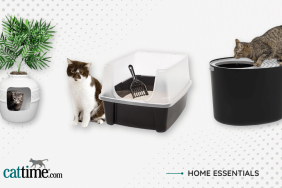Vomiting in cats happens when a cat’s stomach becomes upset. When a cat vomits, they may regurgitate food that they have eaten, along with other substances such as bile or hairballs.
There are a number of factors that might cause a cat to vomit, and a cat vomiting is often not a serious issue. However, if you notice your cat vomiting a number of times a day or even once a week, it’s safest to visit your veterinarian to discover what underlying conditions may be causing the vomiting.
If you see signs that your cat might be vomiting frequently, then you must consult your vet for a proper diagnosis and course of treatment. Here’s what you should know about the symptoms, causes, and treatments of vomiting in cats.
Symptoms Of Vomiting In Cats
Vomiting in cats is a condition where a cat throws up the contents of their stomach. Along with the actual vomit, some of the other symptoms may include:
- Feeling weak
- Acting lethargic
- Presence of blood in the vomit
- Presence of foreign objects in the vomit
- Loss of appetite
If you notice these symptoms in your cat, report them to your vet. It will help them determine the cause and provide treatment.
Causes Of Vomiting In Cats

The cause of vomiting in cats is often an upset stomach. Dietary changes may lead to such gastrointestinal upset.
This might also happen when a cat has ingested something that might be toxic or that they are allergic to. Certain plants, for example, can cause cats to vomit.
Hairballs are also a frequent reason why a cat vomits.
Additionally, if a cat eats their food too quickly, they might regurgitate the contents of their stomach.
Many other illnesses and medical conditions can cause cats to vomit, which is why it’s best to see your vet, especially if you notice other concerning symptoms. Here are a few serious but less common causes:
- Tumors
- Heat stroke
- Liver disease
- Adrenal gland disease
- Dislocation of the stomach
- Intestinal parasites
- Esophagus obstruction
- Kidney disease
Treatments For Vomiting In Cats
If you notice that your cat is vomiting a lot, you must consult with your veterinarian.
When presented with a cat who is vomiting, a vet will want to work out the cause. This might involve asking questions about the cat’s diet and trying to work out if there have been any opportunities for the feline to ingest something that might be poisonous or capable of causing an allergic reaction.
In some cases, your vet might suggest that you bring along a sample of your cat’s vomit.
The cause of your cat’s vomiting will determine the course of treatment. In the case of hairballs, your vet will suggest that you increase the frequency of grooming sessions with your kitty, along with possibly switching to a food formulated to help prevent hairballs.
If it turns out that the vomiting is caused by your cat regurgitating their food, your vet will suggest that you alter any feeding routines and try to encourage your kitty to consume smaller portions spaced throughout the day rather than scarfing down all of their food at once.
In some situations, your vet might prescribe a course of medication to keep your cat’s vomiting under control. If it turns out that ulcers are the issue, the vet might recommend antibiotics.
As ever, if your vet prescribes medication for your cat, it’s vital that you follow the dosage and frequency instructions precisely and complete the entire course of medication.
Has your cat ever started to vomit a lot? Did your vet help you figure out the cause? Tell us all about it in the comments below!









